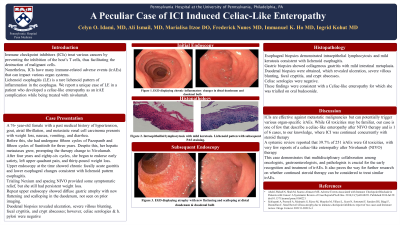Monday Poster Session
Category: Small Intestine
P2710 - A Peculiar Case of ICI-Induced Celiac-Like Enteropathy
Monday, October 23, 2023
10:30 AM - 4:15 PM PT
Location: Exhibit Hall

Has Audio

Celyn idami, MD
Penn Medicine
Philadelphia, PA
Presenting Author(s)
Celyn idami, MD, Ali Ismail, MD, MariaLisa Itzoe, DO, Frederick Nunes, MD
Penn Medicine, Philadelphia, PA
Introduction: Immune checkpoint inhibitors (ICIs) treat various cancers by preventing the inhibition of the host’s T cells, thus facilitating the destruction of malignant cells. However, ICIs have potential immune-related adverse events (irAEs) that can impact various organ systems. We describe a case of newly diagnosed celiac-like enteropathy, collagenous gastritis, and lichenoid esophagitis attributed to ICI therapy.
Case Description/Methods: A 67-year-old female with a past medical history of hypertension, gout, atrial fibrillation, and metastatic renal cell carcinoma presented with weight loss, intermittent nausea, vomiting, and diarrhea.
After three years (15 cycles) of Pazopanib and Sunitinib, her hepatic metastases grew, and therapy was changed to Nivolumab (NIVO), which she took for four years (86 cycles). She then experienced early satiety, left upper quadrant pain, and 30-pound weight loss. EGD showed lichenoid pattern esophagitis and acute and chronic gastritis. Nexium and spacing NIVO provided mild symptomatic relief, yet she underwent repeat EGD due to progressive weight loss. It showed diffuse gastric atrophy with new flattening and scalloping in the duodenum. Biopsies revealed ulceration, severe villous bunting, focal cryptitis, and crypt abscesses. Celiac serologies were negative, raising suspicion for ICI-induced Celiac-like enteropathy. Oral budesonide was added to her NIVO regimen, with a plan to repeat an EGD to assess her response; however, she expired due to malignancy progression before this was completed.
Discussion: ICIs are effective against metastatic malignancies but can trigger organ-specific irAEs. One systemic review suggested 39.7% of 251 irAEs were GI toxicities; Our case is one of six, to our knowledge, where the ICI was continued concurrently with the addition of steroid therapy after the development of celiac-like enteropathy. It demonstrates that multidisciplinary collaboration among oncologists, gastroenterologists, and pathologists is crucial for the early recognition and treatment of GI-related irAEs from ICIs. In addition, clinicians may consider pursuing early endoscopic evaluation in patients with an atypical presentation while on ICI therapy.

Disclosures:
Celyn idami, MD, Ali Ismail, MD, MariaLisa Itzoe, DO, Frederick Nunes, MD. P2710 - A Peculiar Case of ICI-Induced Celiac-Like Enteropathy, ACG 2023 Annual Scientific Meeting Abstracts. Vancouver, BC, Canada: American College of Gastroenterology.
Penn Medicine, Philadelphia, PA
Introduction: Immune checkpoint inhibitors (ICIs) treat various cancers by preventing the inhibition of the host’s T cells, thus facilitating the destruction of malignant cells. However, ICIs have potential immune-related adverse events (irAEs) that can impact various organ systems. We describe a case of newly diagnosed celiac-like enteropathy, collagenous gastritis, and lichenoid esophagitis attributed to ICI therapy.
Case Description/Methods: A 67-year-old female with a past medical history of hypertension, gout, atrial fibrillation, and metastatic renal cell carcinoma presented with weight loss, intermittent nausea, vomiting, and diarrhea.
After three years (15 cycles) of Pazopanib and Sunitinib, her hepatic metastases grew, and therapy was changed to Nivolumab (NIVO), which she took for four years (86 cycles). She then experienced early satiety, left upper quadrant pain, and 30-pound weight loss. EGD showed lichenoid pattern esophagitis and acute and chronic gastritis. Nexium and spacing NIVO provided mild symptomatic relief, yet she underwent repeat EGD due to progressive weight loss. It showed diffuse gastric atrophy with new flattening and scalloping in the duodenum. Biopsies revealed ulceration, severe villous bunting, focal cryptitis, and crypt abscesses. Celiac serologies were negative, raising suspicion for ICI-induced Celiac-like enteropathy. Oral budesonide was added to her NIVO regimen, with a plan to repeat an EGD to assess her response; however, she expired due to malignancy progression before this was completed.
Discussion: ICIs are effective against metastatic malignancies but can trigger organ-specific irAEs. One systemic review suggested 39.7% of 251 irAEs were GI toxicities; Our case is one of six, to our knowledge, where the ICI was continued concurrently with the addition of steroid therapy after the development of celiac-like enteropathy. It demonstrates that multidisciplinary collaboration among oncologists, gastroenterologists, and pathologists is crucial for the early recognition and treatment of GI-related irAEs from ICIs. In addition, clinicians may consider pursuing early endoscopic evaluation in patients with an atypical presentation while on ICI therapy.

Figure: We present the case of a 67-year-old female with metastatic renal cell carcinoma who developed a celiac-like enteropathy following treatment with Immune Checkpoint Inhibitors (ICIs). Very few case reports have documented an association between ICIs and celiac-like enteropathy
Disclosures:
Celyn idami indicated no relevant financial relationships.
Ali Ismail indicated no relevant financial relationships.
MariaLisa Itzoe indicated no relevant financial relationships.
Frederick Nunes indicated no relevant financial relationships.
Celyn idami, MD, Ali Ismail, MD, MariaLisa Itzoe, DO, Frederick Nunes, MD. P2710 - A Peculiar Case of ICI-Induced Celiac-Like Enteropathy, ACG 2023 Annual Scientific Meeting Abstracts. Vancouver, BC, Canada: American College of Gastroenterology.
